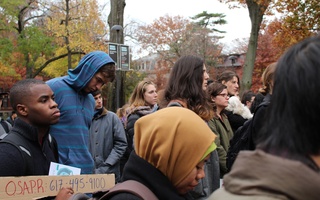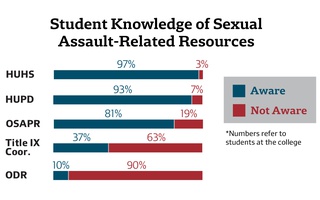In the summer of 2014, when Harvard announced a new set of Title IX policies and procedures, it took a now-familiar step: centralizing resources and making standards uniform across the University’s 12 schools.
The new Title IX framework included an overhauled definition of sexual harassment governing each Harvard school and created a single investigative office to handle complaints from across the University. Mia Karvonides, the first University-wide Title IX Officer, began to oversee and enforce the new policy. The Office of Sexual Assault Prevention and Response hired a new counselor to focus on students at Harvard’s graduate and professional schools. {shortcode-0ca078e010cbe9032aedcfc567192377ed564dfd}
A task force dedicated to studying sexual assault prevention at Harvard took a similar tack, calling for the creation of a new position focusing on sexual assault prevention in the Provost’s office. Administrators, professors, and students from across Harvard worked on the task force for almost two years to formulate the final report, drawing on a University-wide sexual misconduct survey administered last year.
“It is hard to imagine how such a long-term focus can occur without having a dedicated person responsible for ensuring that the University remains focused on the inevitably evolving requirements of an effective prevention program at a complex institution,” the task force wrote in a final report released Tuesday.
As Harvard grapples with the pernicious issue of sexual assault on campus, its efforts have echoed a greater institutional shift in recent decades. Instead of the so-called “Every Tub on Its Own Bottom” model, where every individual school operates mostly autonomously, Harvard has increasingly embraced a “One University” structure, locating resources in and crafting policies from its central administration.
With the creation of the new position in the Provost’s office, Harvard plans to institutionalize the task force’s University-wide work. The new administrator will orchestrate the work of the Title IX coordinators, the Office for Sexual Assault Prevention and Response, and other offices; measure the effectiveness of prevention programs; and develop new educational materials for students and faculty. Individual schools will implement many of the task force’s recommendations. {shortcode-c675dda87cfb1a64a704ee1a40878fec60a2e436}
University Provost Alan M. Garber ’76 said his office had accepted the recommendation and is defining the precise duties of the new administrator.
“We will also determine the qualifications candidates will need to be successful in the new role,” Garber wrote in an email. “Because this is a completely new position, it will be important to work out these details before we actually start the hiring process.”
Peter F. Lake ’81, a higher education expert at Stetson University College of Law, said he supports the new position, arguing that it will help Harvard better implement sexual assault prevention programs.
“A lot of times these people do work hand in hand with the Title IX Coordinator,” Lake said. “But there's just so much work to do and detail to follow through that you almost need a planner or executing individual that can help to manage the flow of all the work.”
But Harvey A. Silverglate ’67, a local attorney who advises students during Harvard’s disciplinary processes, contended that the new position represents another example of needless growth within Harvard’s administration. He said that continually creating administrative positions hurts Harvard more than it helps.
“It’s a voracious beast,” Silvergate said of Harvard’s administration. “It’s a dragon that continually needs to feed itself to breathe fire.”
The centralization of Harvard’s sexual harassment policy has also met resistance within the University, most notably from the Law School. After Harvard’s Title IX office instituted its University-wide standards, professors at the Law School lambasted the policy in the press and ultimately opted out of the system altogether, developing an independent set of investigation procedures for its students.
Beyond creating the new administrative position, the task force’s report also called for every Harvard student to receive annual sexual assault prevention training and asked the College to develop “a plan to address the problems presented by Final Clubs.” Faust, a proponent of a collaborative “One Harvard” model, said in a statement Tuesday she would accept the task force’s recommendations.
—Staff writer Andrew M. Duehren can be reached at andy.duehren@thecrimson.com. Follow him on Twitter @aduehren.
—Staff writer Daphne C. Thompson can be reached at daphne.thompson@thecrimson.com. Follow her on Twitter @daphnectho.
Read more in College News
Housing Day Brings Fanfare, and Disappointment, to FreshmenRecommended Articles
-
 Sexual Assault Task Force Has Yet to Release Report
Sexual Assault Task Force Has Yet to Release Report -
 Our Harvard Can Do Better Outlines Goals For Semester
Our Harvard Can Do Better Outlines Goals For Semester -
 Grappling with Campus Sexual Assault, Harvard Looks to Expand Prevention Efforts
Grappling with Campus Sexual Assault, Harvard Looks to Expand Prevention Efforts -
 Eight Key Takeaways from the Sexual Assault Prevention Report
Eight Key Takeaways from the Sexual Assault Prevention Report -
UC Concerned Over Some Sexual Assault Prevention ProposalsUndergraduate Council representatives criticized recent recommendations on alcohol policies in Harvard's report on sexual assault prevention, though they praised the report’s call for annual sexual assault training for students.













